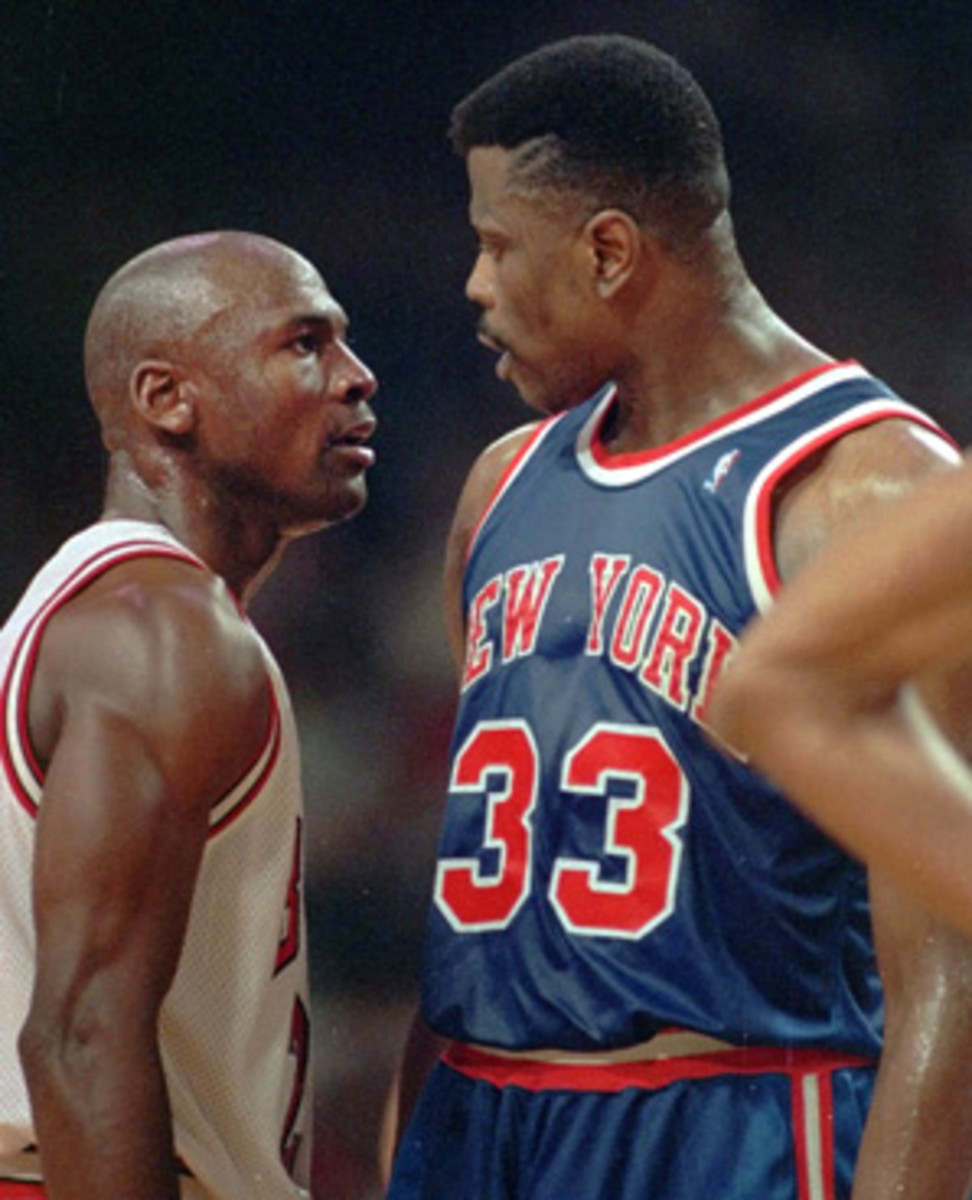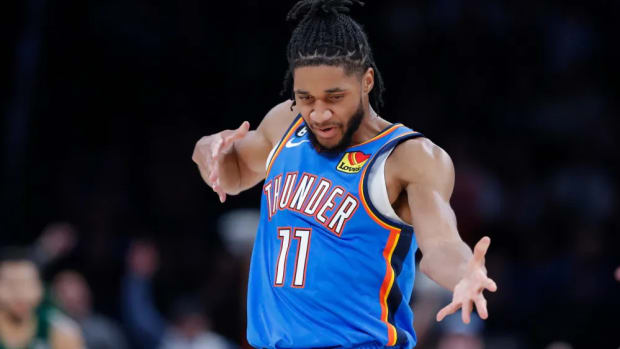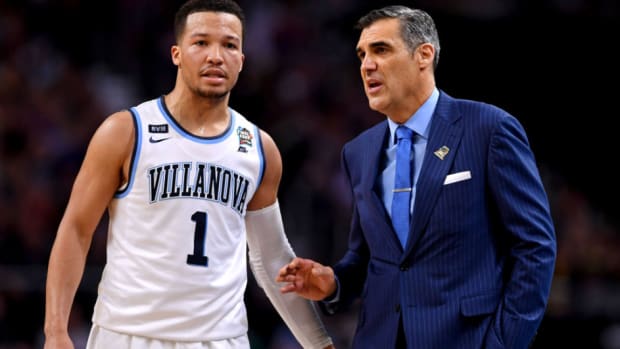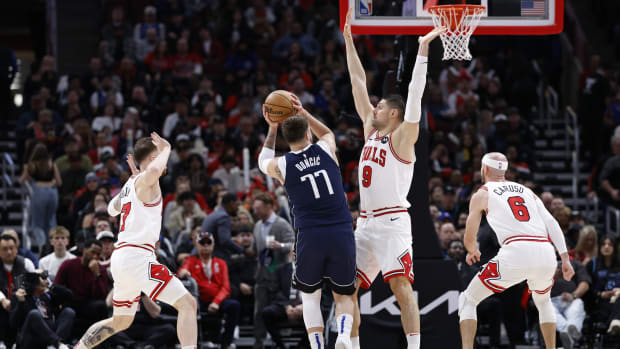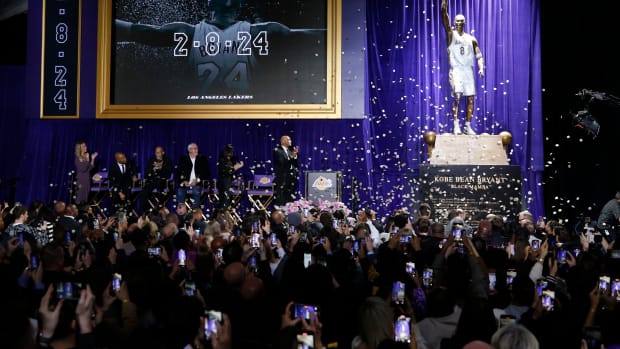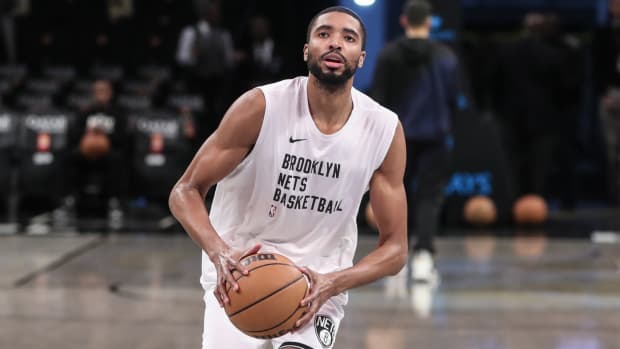What happened to the talkers?
Carl, however, didn't deliver this riff orally. He sent it via text message.
Such is the sorry state of trash talk in the NBA today. There was a time not all that long ago when the ability to spew verbal shrapnel was as much a part of a player's basketball repertoire as his dribbling ability or crossover skills. Stars talked smack. Scrubs talked smack. Fans talked smack. Even refs talked smack. Told he was having an off night, longtime official Earl Strom once responded to a player, "I guarantee that you've missed more shots tonight than I've missed calls."
Today? Sit courtside at an NBA game and you won't hear much more than the squeak of sneakers and the tweet of the whistles. Oh, the players still have plenty to say -- as any of, say, Kevin Durant's 107,000 Twitter followers can attest. Nor is it the case that the NBA has entered an era of modesty and civility, not so long as players are bringing guns into locker rooms and allegedly threatening to ventilate each other with bullets over gambling debts.
But for whatever reason, trash-talk has become the equivalent of a dance step that's fallen out of vogue. One player blames technology. "Everybody picks up on everything and stuff goes viral and gets blown out of proportion, so you're better off not making controversy." To prove his point, he then asks not to be quoted by name.
It's hard to trace the origins of trash-talk. But by the mid-1980s, NBA games featured more chatting than a class taught by a substitute teacher. In Boston, Larry Bird was seldom shy about self-aggrandizing. During one game against the Sonics, Bird scored over Xavier McDaniel with two seconds left. Bird then turned to McDaniel and deadpanned, "Damn! I didn't mean to leave any time left on the clock."
In Chicago, Michael Jordan, clenched his teeth behind his smile and often asserted his superiority. As Doug Collins, who coached Jordan both in Chicago and Washington, put it: "When you play Michel Jordan, you have to stand up to him physically, but you have to stand up to him mentally as well because he will torment you."
In Seattle, Gary Payton was in perpetual danger of suffering a sprained jaw and larynx, sometimes jabbering even as he drove to the basket. Payton was so verbally inclined that he even trashed his own teammates, referring, for instance, to Sonics center Ervin Johnson as "Tragic Johnson."
In L.A., Shaquille O'Neal's unique brand of trash talk -- Shaq smack? -- often questioned the masculinity of the subject. The Sacramento Kings were "the Sacramento Queens." Lawrence Frank became "Laura Frank," after the Nets' coach complained that O'Neal benefitted from too many calls. When JerryStackhouse attempted to intentionally foul Shaq, he responded, "My daughters tackle me harder when I come home. ... It actually felt pretty good to get hit like that. Thanks, Jerry."
The soliloquies of some players could skew a bit vulgar. In the course of talking trash, it isn't uncommon to question the virtue of an opponent's wife or sister or mother. The Timberwolves' Brian Cardinal tells a story that, early in his career, he blocked a shot by Shawn Kemp, then with the Portland Trail Blazers. On the trip down court, Kemp's woofing was so fierce that Cardinal began to blush. And just as "words lead to action" on the playground, trash-talk could sometimes escalate into violence.
But, on balance, it's easy to argue that trash is -- or was -- ultimately a force of good. Even when delivered with an edge, it was usually in good fun. Sometimes it doubled as a bit of psychological warfare, intended to sow seeds of doubt in the opponent's head. This could backfire, imbuing opponents with extra motivation. (You talked trash to Jordan at your own peril ... which many learned after the fact.) Whatever, it added another dimension to the sport.
Trash-talk also helped grease the wheels of the NBA's star machine. It was another way for players to express themselves and reveal personality and character. It's no coincidence that the most gifted players of the last generation were also some of most gifted talkers.
One contemporary figure who understands the code and virtue of trash-talk? Barack Obama. You might recall that during the early weeks of his presidency, Obama attended a Wizards game and rooted for his hometown team, the Bulls. A vocal instigator, Mike Rawls, began woofing at the President. Obama waved off secret service and dished it right back. The two men spent most of the game exchanging tracer fire.
"I just had to see how he was gonna take it," Rawls told TheWashington Post. "Once I knew he was a big trash-talker, too, about them Bulls, that means the gloves came off. ... He was talking trash and I was talking trash. I couldn't believe he was that laid back and real. I loved it."
There are still a few notable practitioners in the NBA today. In a recent Sports Illustrated poll that asked players to select the biggest trash-talker, Kevin Garnett won in a landslide with 62 percent. But his monologues are less classic trash than a sort of spill-over from his overall intensity. Nate Robinson, who ranked fifth in the poll with 3 percent, is known to talk, though it's usually just his Napoleon complex kicking in.
Yet, we pine for a return to the day when Jordan would sink a shot and ask his man, "Doesn't your coach get mad when you don't play defense?" It was spontaneous, it was fun, it was revealing. And it wasn't issued with that 140-character limit in mind.
***
More Trash-Talking
GALLERY:Today's biggest talker is ...TRASHIEST MOMENTS:SI.com writers relive their favoritesFOLLOW 'SHEED:Wallace, teammates reveal his skill of talking






























